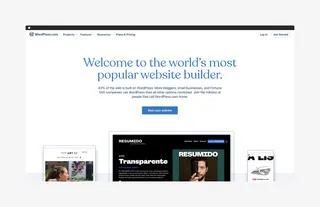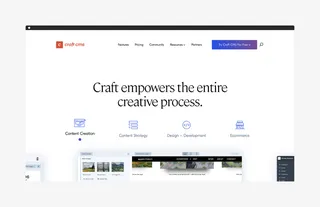WordPress Alternatives: Here’s Why Craft CMS is the Perfect Fit


WordPress has long been a dominant force in content management systems (CMS), powering an impressive 40% of the web. However, recent events have shaken the WordPress community to its core, leaving many users questioning their loyalty to the platform and seeking WordPress alternatives.
At MadeByShape, we've always believed in producing best-in-class work for like-minded people. Part of that commitment involves staying ahead of industry trends and guiding our clients towards solutions that best serve their needs. Today, we're diving into the recent WordPress controversy and exploring why Craft CMS is the alternative you've been looking for (not bias here whatsoever).

To understand the current state of affairs, we need to take a step back and look at the players involved. WordPress, an open-source CMS, has been the backbone of the web for nearly two decades. Its success is largely attributed to its vibrant community of developers and users, led by Matt Mullenweg, CEO of Automattic and co-founder of WordPress.
Enter WP Engine, one of the largest managed WordPress hosting providers. For years, WP Engine has been a significant player in the WordPress ecosystem, hosting thousands of WordPress sites and contributing to the platform's growth.
However, the harmonious relationship between these two WordPress giants has recently hit a sour note. The fallout between WP Engine and Matt Mullenweg has sent shockwaves through the WordPress community, leaving many users caught in the crossfire.
The conflict centers around a trademark dispute that quickly escalated into a full-blown legal battle. In early 2023, WP Engine attempted to trademark the term "WP Engine," a move that Automattic strongly opposed. Automattic argued that the "WP" prefix should remain available for general use within the WordPress community, as it has been for years.
This disagreement led to a series of legal actions and counter-actions. WP Engine filed a lawsuit against Automattic, claiming trademark infringement and unfair competition. Automattic, in turn, filed a petition with the U.S. Patent and Trademark Office to cancel WP Engine's trademark registration for "WP Engine."
The legal battle has raised significant questions about the use of "WP" in business names and trademarks within the WordPress ecosystem. It has also highlighted the delicate balance between commercial interests and the open-source ethos that has long defined the WordPress community.
As the legal dispute intensified, the situation took a dramatic turn when WP Engine implemented a ban on Automattic employees, including Mullenweg himself, from attending their events. This move was seen by many as an escalation of hostilities and a departure from the open, collaborative spirit that has long defined the WordPress community.
The ban has had far-reaching effects:
The trademark battle itself has become a focal point of discussion within the WordPress community. It has raised questions about the commercialisation of open-source projects and the boundaries between community contributions and proprietary business interests.
The ongoing legal dispute has had significant consequences for both companies and the broader WordPress ecosystem:
The repercussions of this dispute have been far-reaching, affecting not just WP Engine and Automattic, but the entire WordPress ecosystem. Users hosted on WP Engine found themselves unable to update their sites, causing significant disruption to their operations. The trademark battle has also raised questions about the future of WordPress and the potential fragmentation of its ecosystem.
This unrest has left many WordPress users feeling uncertain about the platform's future and considering alternatives. While WordPress remains a powerful and versatile CMS, recent events have highlighted the potential risks of relying too heavily on a single ecosystem, prompting many to explore other options like Craft CMS.

With the recent turbulence in the WordPress ecosystem, many website owners and developers are re-evaluating their CMS choices. While WordPress has served millions well, its dominance has also led to some inherent challenges:
These factors, combined with the recent community unrest, have led many to explore alternative content management systems. Enter Craft CMS – a powerful, flexible, and developer-friendly alternative that addresses many of WordPress's limitations.

Craft CMS, first released in 2013, has steadily gained popularity among developers and content creators alike. Built with a "content-first" approach, Craft offers a refreshing take on content management that priorities flexibility, security, and performance.
While both WordPress and Craft CMS are powerful content management systems, they each have their own strengths and weaknesses. Let's break down how these two platforms compare across various key aspects:
WordPress: Known for its user-friendly interface, WordPress is often praised for its low barrier to entry. It's relatively easy for beginners to set up a basic website or blog.
Craft CMS: While Craft has a steeper learning curve, its interface is clean and intuitive once you understand it. It offers more flexibility in content structuring, which can be powerful but may require more initial setup.
WordPress: Offers a vast array of themes and plugins, making it easy to add functionality without coding. However, extensive customisation often requires working around existing structures.
Craft CMS: Provides a blank canvas approach, allowing developers to build exactly what they need from the ground up. Its flexible content modelling is particularly powerful for complex sites.
WordPress: Can be fast with proper optimisation, but often requires additional caching and performance plugins to handle high-traffic sites.
Craft CMS: Generally offers better out-of-the-box performance, with efficient database queries and a lighter codebase.
WordPress: Its popularity makes it a frequent target for attacks. Regular updates and security plugins are crucial.
Craft CMS: Built with security in mind and has fewer vulnerabilities due to its smaller market share and more controlled plugin ecosystem.
WordPress: Offers robust SEO capabilities, especially with popular plugins like Yoast SEO.
Craft CMS: Provides strong built-in SEO tools and the flexibility to implement advanced SEO strategies without relying heavily on plugins.
WordPress: Can handle growth but may require significant optimisation and potentially custom solutions for very large or complex sites.
Craft CMS: Designed to scale efficiently, handling complex content relationships and multi-site setups with ease.
WordPress: This has a lower barrier to entry for developers but can be frustrating for complex custom development due to legacy code and inconsistencies.
Craft CMS: Offers a clean, modern codebase and powerful APIs, making it a favourite among developers for custom projects.
WordPress: Boasts a massive community, countless resources, and easy access to support (both free and paid).
Craft CMS: Has a smaller but highly engaged and helpful community. Official support is excellent, but third-party resources are less abundant compared to WordPress.
WordPress: The core CMS is free, with costs primarily coming from premium themes, plugins, and hosting.
Craft CMS: Requires a license fee for commercial use, but potentially fewer costs for premium plugins. The investment often pays off in reduced development time and maintenance.
For a detailed comparison of the pros and cons of WordPress vs Craft CMS, check out our in-depth guide here.
After considering the strengths and weaknesses of both WordPress and Craft CMS, you might be wondering if making the switch to Craft is the right move for your project. Here are several compelling reasons why Craft CMS could be the ideal choice for your next website:
Craft CMS's content modelling capabilities are second to none. Whether you're building a simple blog or a complex e-commerce platform, Craft allows you to structure your content exactly as you need it. As your business evolves, Craft's flexibility ensures your website can adapt without major overhauls.

In today's fast-paced digital world, site speed and performance are crucial. Craft CMS is built for speed from the ground up, with efficient database queries and a streamlined codebase. This means faster load times, better user experience, and improved SEO rankings. As your traffic grows, Craft scales effortlessly, maintaining performance even under heavy loads.
See how we built a high-performance site with Craft
With cyber threats on the rise, security should be a top priority. Craft CMS's security-first approach, regular updates, and smaller plugin ecosystem significantly reduce your vulnerability to attacks. This means less time worrying about security breaches and more time focusing on your core business.
If you're working with a development team or are a developer yourself, Craft CMS offers a refreshing experience. Its clean, intuitive API and powerful Twig templating engine allow for rapid development of custom features. This translates to shorter development times, easier maintenance, and ultimately, cost savings.
Learn more about our Craft CMS development expertise
While Craft CMS may have a slight learning curve, its admin panel is designed with content creators in mind. Once familiar, users often find Craft's interface more intuitive and efficient than WordPress, especially for managing complex content structures.
In our global market, multilingual websites are increasingly important. Craft CMS offers robust, built-in localisation features, making it easy to manage content in multiple languages without relying on third-party plugins.
While Craft's plugin marketplace may be smaller than WordPress's, the quality is consistently high. Plugins are carefully curated, reducing the risk of conflicts and security vulnerabilities often associated with extensive plugin use in WordPress.
With its modern architecture and continuous development, Craft CMS is well-positioned for the future of web development. Its ability to integrate with modern development tools and practices ensures your website won't become technologically obsolete.
While smaller than the WordPress community, the Craft CMS community is known for its passion and expertise. The official support from Pixel & Tonic (Craft's creators) is excellent, and the community forums are a valuable resource for problem-solving and innovation.
Making the switch to a new CMS is a significant decision, and it's natural to have concerns. However, the long-term benefits of Craft CMS – in terms of flexibility, performance, security, and developer satisfaction – often outweigh the initial transition efforts.

At MadeByShape, we've guided numerous clients through the transition to Craft CMS, and the feedback has been overwhelmingly positive. Clients appreciate the enhanced control over their content, the improved site performance, and the ability to easily expand their web presence as their business grows.
While WordPress remains a viable option for many, Craft CMS offers a compelling alternative for those seeking a more tailored, efficient, and future-proof web solution. As the digital landscape continues to evolve, having a flexible, secure, and powerful CMS like Craft can be a significant competitive advantage.
As we've explored throughout this post, the recent upheaval in the WordPress ecosystem has opened the door for many to reconsider their CMS choices. While WordPress has served the web well for many years, the digital landscape is evolving, and with it, the needs of businesses and developers are changing too.
Craft CMS emerges as a powerful alternative, offering a blend of flexibility, performance, and security that addresses many of the pain points experienced by WordPress users. Its content-first approach, coupled with a developer-friendly architecture, positions it as an excellent choice for businesses looking to create unique, scalable, and future-proof web experiences.
However, it's important to remember that there's no one-size-fits-all solution in the world of content management systems. The right choice depends on your specific needs, resources, and goals. While we at MadeByShape are enthusiastic advocates for Craft CMS, we encourage you to carefully evaluate your options based on your unique circumstances.
Consider factors such as:
If you find yourself frustrated with the limitations of WordPress, or if you're starting a new project that demands flexibility and performance, we highly recommend giving Craft CMS a closer look. Its powerful features, clean architecture, and vibrant community make it a compelling choice for modern web development.
Remember, the goal is not just to build a website, but to create a digital platform that can grow and evolve with your business. In our experience, Craft CMS provides the tools and flexibility to do just that.
We invite you to reach out to us at MadeByShape if you have any questions about Craft CMS or if you're considering making the switch. Our team of experts would be happy to discuss your project needs and help you determine if Craft CMS is the right fit for you.
Web Developer at Shape – if I’m not watching football with a pint in hand, I’m building Craft CMS websites with my dog Dave (who mostly ‘helps’ by stealing my seat).